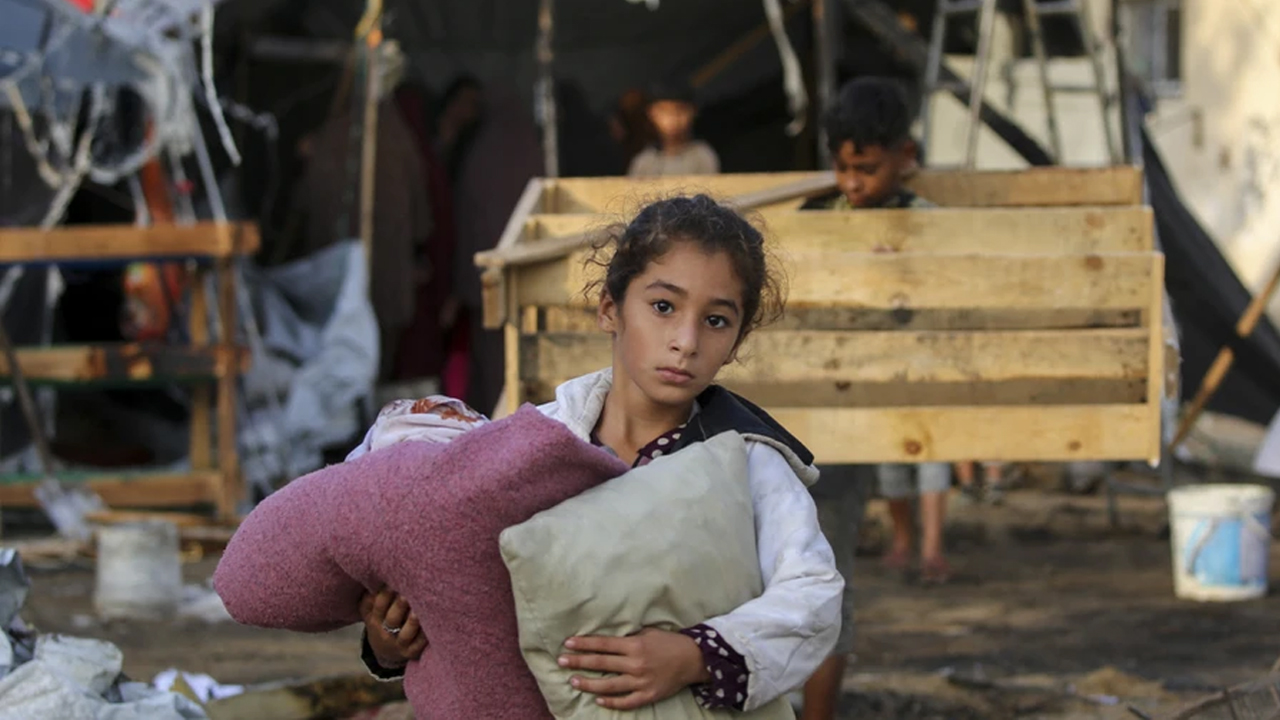“In Gaza, children are the most vulnerable group, and their basic needs, especially their sense of safety, have become non-existent,” said one relief worker.
By Julia Conley
Oct 09, 2024
The International Rescue Committee said Wednesday that the number of children who have been orphaned or separated from their parents is likely three times higher than the amount estimated by the United Nations earlier this year, with thousands of children caught up in the chaos of escalating Israeli attacks and evacuation orders in recent months.
Official estimates of orphaned or unaccompanied children range from about 17,000-19,000, but the IRC said that “based on previous experience of other crises,” the number is likely as high as 51,000.
The IRC said that the Israel Defense Forces’ (IDF) continued assault on Gaza, where it has repeatedly attacked civilian infrastructure and so-called “humanitarian zones”—in many cases with U.S. weapons—risks creating a “forgotten generation.”
The group’s report came out as IDF attacks on northern Gaza entered their fifth day, forcing thousands of people to flee to the supposed safe zone of Al-Mawasi, which has been targeted repeatedly by Israel in recent months. Dozens of people have been killed in the IDF’s recent escalation in the north.
The United Nations Relief and Works Agency for Palestine Refugees in the Near East (UNRWA) also reported that at least seven schools being used as shelters for displaced people had been evacuated due to Israeli attacks.
Along with evacuations, the arrests of hundreds of Palestinians in Gaza have exacerbated the rise in the number of unaccompanied children, said the IRC.
The group said its humanitarian workers have encountered children living alone in hospitals and that unaccompanied and orphaned children are at high risk for exploitation, child labor, and starvation, especially as Gaza’s entire population of 2.3 million people faces acute food insecurity.
“In Gaza, children are the most vulnerable group, and their basic needs, especially their sense of safety, have become non-existent,” said Faten Abu Mousa, child protection manager for the IRC in Gaza.
“Children in Gaza cannot wait any longer, prolonged restrictions on humanitarian aid and continued fighting means that a generation of children will now experience life-long health and developmental issues.”
The group said it has partially focused its work on providing mental health and other support services to children, especially those who have lost or been separated from their parents or caregivers.
Even before Israel’s latest escalation in Gaza, which passed the one-year mark on Monday, at least half a million children in the enclave were in need of mental health and psycho-social support, said the IRC.
“Now, the burden of witnessing profoundly distressing events, multiple displacements, and lack of safety means that every child, parent, and caregiver in Gaza is experiencing trauma, which could require long-term mental health and psycho-social support,” said the organization.
The IRC warned that its aid teams have seen “increased rates of severe and acute malnutrition in children under five” across Gaza with humanitarian operations in northern Gaza “severely restricted” due to the current wave of attacks.
“Even if a child survives acute malnutrition, they will often face long-term health impacts, and require lifelong support,” said the group, warning of the risk of stunting—when a child’s growth and cognitive development are behind for their age—and wasting, when a child’s weight is too low for their height due to rapid weight loss from lack of nutrition.
“In these cases, the child’s risk of death is more than 11 times higher than that of a healthy child especially because their weakened bodies are not able to fight off common diseases,” said the IRC.
Children across the enclave have also missed an entire of year of schooling, and the trauma and destruction of Israel’s bombardment is likely to set back children’s education for up to five years in Gaza, where education and high literacy rates have long been a source of pride.
“Children are bearing the brunt of this war, and it’s clear that without an immediate and lasting cease-fire in sight, the long-term impacts will only become greater,” said Bart Witteveen, IRC country director for the occupied Palestinian territory. “The international community must act immediately to safeguard children, not just in the immediate term, but also taking into account their long-term health needs, whether related to mental health, healthcare, or education. Children in Gaza cannot wait any longer, prolonged restrictions on humanitarian aid and continued fighting means that a generation of children will now experience life-long health and developmental issues.”
Humanitarian groups have called for a lasting cease-fire in Gaza for a year, but the conflict has spread to other parts of the Middle East in recent weeks, with Israel invading Lebanon last month and killing more than 2,100 people there in recent attacks, Iran retaliating against Israel last week, and some U.S. lawmakers pushing for an attack on Iran.
Julia Conley is a staff writer for Common Dreams.
This article is republished from Common Dreams under a Creative Commons license.
Read the original article.

